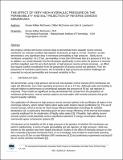THE EFFECT OF VERY HIGH HYDRAULIC PRESSURE ON THE PERMEABILITY AND SALT REJECTION OF REVERSE OSMOSIS MEMBRANES
Author(s)
McGovern, Ronan Killian; McConnon, Dillon; Lienhard, John H
DownloadIDAWC15_Paper_v11.pdf (309.5Kb)
OPEN_ACCESS_POLICY
Open Access Policy
Creative Commons Attribution-Noncommercial-Share Alike
Terms of use
Metadata
Show full item recordAbstract
We employ a stirred-cell reverse osmosis setup to demonstrate that a seawater reverse osmosis membrane can maintain excellent salt rejection at pressures as high as 172 bar. However, we also demonstrate a very significant drop in membrane permeability at high pressures–likely due to membrane compaction. At 172 bar, permeability is more than 50% lower than at a pressure of 34.5 bar. In addition, our results illustrate how flux fluctuates significantly in time when the pressure is removed and then reapplied, even for very short periods, in high pressure reverse osmosis processes–an effect that requires careful consideration from the perspective of process control and operation. From the perspective of membrane performance, RO is feasible at high pressures but distinct challenges are presented by reduced permeability and increased variability in flux.
Date issued
2015-08Department
Massachusetts Institute of Technology. Abdul Latif Jameel World Water & Food Security Lab; Massachusetts Institute of Technology. Department of Mechanical EngineeringJournal
Proceedings of the 2015 IDA World Congress on Desalination and Water Reuse
Publisher
International Desalination Association
Citation
McGovern, Ronan Killian, Dillon McConnon, and John H. Lienhard V. "THE EFFECT OF VERY HIGH HYDRAULIC PRESSURE ON THE PERMEABILITY AND SALT REJECTION OF REVERSE OSMOSIS MEMBRANES." 2015 IDA World Congress on Desalination and Water Reuse (August 2015).
Version: Author's final manuscript